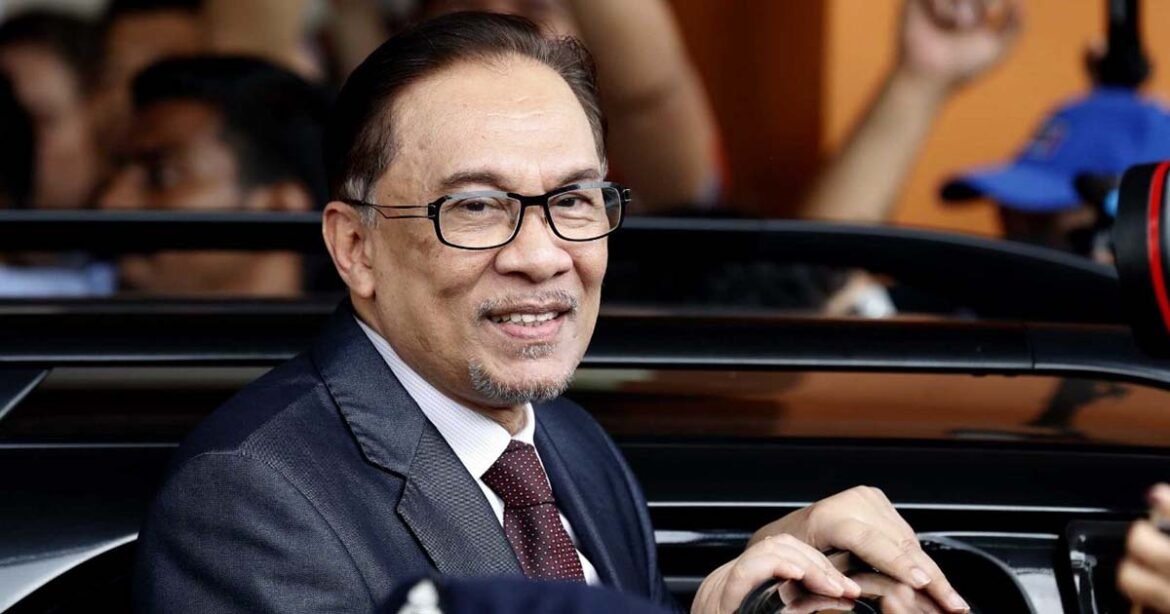Anwar Ibrahim is the new prime minister of Malaysia after the nation’s palace made the declaration today, ending a prolonged electoral deadlock.
Anwar Ibrahim, the leader of Pakatan Harapan (PH) sworn in as Malaysia’s newly appointed prime minister. In accordance with the Malaysian constitution, the king appointed Anwar as Malaysia’s tenth prime minister after a meeting with state leaders.
Saturday’s general election resulted in a historically hung parliament. Neither of the two major alliances, one led by Anwar and the other by ex-premier Muhyiddin Yassin was able to promptly obtain enough votes to form a government. Anwar’s appointment ends a three-decade journey from heir apparent to sodomy prisoner to the opposition leader.
YOU CAN ALSO READ: WORLD IN CRISIS: ARE WE HEADING TOWARDS RECESSION?
A premiership was declared by the Malaysian King after both Anwar and Muhyiddin missed the Tuesday afternoon deadline to form an alliance, King Al-Sultan Abdullah Sultan Ahmad Shah made the final decision about the prime minister. In the election held on Saturday, Anwar’s Pakatan Harapan alliance secured 82 seats, while Muhyiddin’s Perikatan Nasional party scored 73 seats. To form a government, they required 112 seats, which is a simple majority. The Barisan Nasional, which has been in power since 1957, only managed to win 30 seats in the legislature, which was its poorest electoral performance ever.
An end of political uncertainty? Or, the rise of ethnic tension?
Earlier, Najib Razak’s involvement in the multibillion-dollar 1Malaysia Development Berhad (1MDB) scandal caused political chaos in Malaysia. Razak was the former prime minister and chair of Barisan Nasional. Najib was given a 12-year prison term. But Muhyiddin Yassin, Anwar’s rival for the leadership, and other Pakatan Harapan members left in 2020 to form Perikatan Nasional. The defection brought down the Pakatan government.
Anwar leads a multiethnic coalition of parties with progressive leanings. His supporters hoped that Anwar’s government would prevent a return to historical hostility between the Malay, Muslim majority and Chinese and Indian minority. However, authorities warned that there was more racial tension on social media and TikTok after the weekend votes.
The Malaysian palace has claimed that Anwar has been selected as Prime Minister for the stability of the government. The question now is, would Anwar be able to restore stability when the country might be divided along racial and religious lines?
Challenges for the newly appointed PM, Anwar Ibrahim
As premier, Anwar will have to deal with rising inflation, declining growth, and reducing ethnic unrest. The budget for next year, which was put on the table before the election was called, will be the most important issue right away. To maintain a majority in parliament, Anwar will further need to seek agreements with lawmakers from other parties.
Though the king’s decision confirmed Anwar’s premiership, voters admitted the tight margin in parliament may imply more uncertainty as Anwar’s government forms.
Who is Anwar Ibrahim?
Anwar Ibrahim, also known as Anwar Bin Ibrahim, was born on August 10, 1947. He is a politician, reformer, and moderate Islamist from Malaysia. In late 20th century, he held many government jobs before being sent to prison for corruption in 1999. Anwar played a crucial role in the redistribution of power within the Malaysian legislative upon his release from prison. Anwar has served as a lecturer at the Universities of Oxford, Baltimore’s Johns Hopkins University, and Washington D.C.’s Georgetown University.
Political career
Anwar, the son of politicians, started his own political career in the late 1960s at the University of Malaya in Kuala Lumpur. There he was known as an Islamist student leader. He established the Muslim Youth Movement of Malaysia in 1971 and led it as president until 1982. Anwar accepted an invitation from then-prime minister Mahathir bin Mohamad to join United Malays National Organization (UMNO) and his government in 1982.
Anwar moved up quickly, becoming minister of culture, youth, and sports in 1983, minister of agriculture in 1984, and minister of education from 1986 to 1990. Later on, he became the minister of finance from 1991 to 1998 and deputy prime minister from 1993 to 1998). While leading Malaysia to unprecedented economic growth in the 1990s, Anwar earned the appreciation of his colleagues all across the world.
Anwar was fired in 1998, and he was put in jail in 1999 on charges of corruption. Later, he was also charged with sodomy.
Anwar made a significant advancement in his political career by winning a by-election for a lower house seat in August 2008 while serving as the leader of the opposition.
Before the 2008 elections, additional sodomy accusations hampered Anwar’s electoral rise. Early in 2012, following a two-year trial, he was ultimately found not guilty of those accusations. An appeals court overturned Anwar’s 2012 acquittal and sentenced him to five years in prison shortly before the 2014 state elections in Selangor. He was anticipated to be elected chief minister there. In 2015, the conviction and sentence were upheld by Malaysia’s Federal Court. Anwar denied the accusations and said that they were part of a “political conspiracy.” Anwar served as a member of the House of Representatives of Malaysia from 2018 to 2022.


